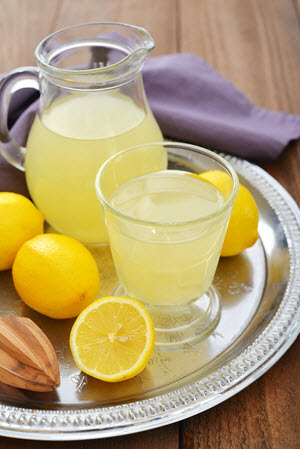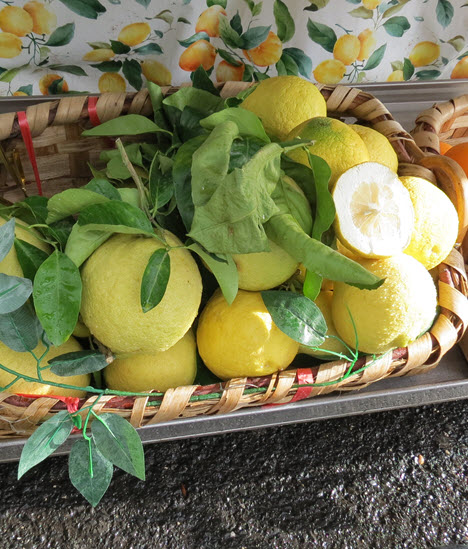Do you find you get lured to take a detox, especially after the holidays? As we get older our bodies build up toxins, but there is no reason to do a costly cleanse. The body detoxes naturally but a simple glass of water with a squirt of lemon can help that process along.
Nature’s cure for many afflictions
When you sip water with lemon it helps purify the blood in your body. Lemon has also been known to relieve a headache, lower blood pressure, freshen breath, reduce asthma symptoms, aid digestion, and reduce respiratory phlegm. Lemons can also help prevent arthritis, rheumatism, throat infections, gum disease, and kidney stones. If you want a little extra zing add a bit of fresh ginger and honey to your water as well.

A word of caution: Too much lemon water can damage your teeth and make them super sensitive. Only drink it once in a while, contrary to what many lemon-water lovers say. This is especially true as you get older and your teeth are more fragile.
You can also eat some of the white pith of a lemon or other citrus fruits because they contain powerful bioflavonoids that are anti-aging and health-enhancing. A citrus fruit’s bioflavonoid levels are highest when picked fresh and ripe. Shred the white pith into lemon zest and use it to flavor dishes such as desserts, meat, fish, or salads.
A brief world history of lemons
When I visited Sorrento and the Amalfi Coast gorgeous lemon trees were everywhere. Italians have been eating and using them since Roman times to flavor their food and desserts, formulate perfume, make natural household products, and for medicinal purposes. The Sfusato lemon of Sorrento and the Amalfi Coast is unique to Italy. It originated in the Himalayas where Lamas used lemons for therapeutic purposes.
Citrus crops were first cultivated in China about 4,000 years ago. The Chinese became masters of growing citrus and introduced it to India. Arab traders brought the trees to the Middle East and the Mediterranean as early as 310 BC.
Frescos at the ruins of Pompeii depict citron trees (a type of citrus) but they were only used for decoration and not to eat. The Romans began growing citrons somewhere around the 1st century BC. At first, they didn’t bear fruit because the climate was too cool so they developed special enclosures with glass made of mica. It kept out the cold and let the sunshine in.
The Rpmans didn’t start to eat citrons until about the 4th century. By the end of the 14th century, they had improved their greenhouses and constructed artificially heated “orangeries.”
Arab traders brought other varieties of citrus such as lemons, sour oranges, and sweet oranges to the Mediterranean region around the 7th century and spread Islam as well as Arabic culture throughout the area.
The citrus industry in the Mediterranean didn’t really start to blossom until after the discovery of the Americas.
Columbus planted seeds on the islands of Haiti and the Dominican Republic in 1493 and they eventually spread to the other islands in the Caribbean. By the 16th century, the Spanish had introduced citrus to Mexico, Florida, and Peru. The Portuguese brought it to Brazil. The fruit of oranges and lemons were initially grown to provide vitamin C for sailors on long sea voyages so they wouldn’t become ill with scurvy.
Franciscan monks introduced it to California in 1769 and it eventually became a huge industry. That is where sweet Meyer and Eureka lemons come from.
Lemony Facts
- A traditional dish on the Amalfi Coast is a plate of lemon and orange slices served with olive oil, balsamic vinegar, and salt.
- In the Arab world, lemons were used to season meat and fish because their puckery flavor stimulated the appetite.
- The Sacra Infermeria, medieval Europe’s largest hospital, run by the Knights of Malta, used lemons as an antiseptic for gastrointestinal infections.
- Although lemon contains citric acid, it makes your water more alkaline with a higher pH.
Other uses
For beauty
- Lighten up age spots – Apply a cut lemon to dark spots and freckles. Let it sit on your skin for 15 minutes to brighten your skin.
- Remove warts – Dab the juice directly on a wart using a Q-tip or cotton cloth. Repeat for several days and it will start to disappear.
- Clean and whiten nails – Soak your fingers in a bath of warm water and lemon juice. Rub some of the peel back and forth on top of your nails.
- Soften up elbows and feet – Mix baking soda and lemon juice to make a paste. Rub it into your elbows or rough parts of your feet. Rinse and then massage elbows and feet with olive oil.
- Treat dandruff – Massage your scalp with 2 Tbsp. of lemon juice and then rinse.
For household
- Freshen up your refrigerator – Soak a cotton ball in lemon juice and leave it in your fridge for several hours.
- Sanitize your cutting board – Rub half of a cut lemon over your cutting board after use.
- Keep insects out of your house – Squirt lemon juice on doors and thresholds. Squeeze the juice into holes and cracks where ants are entering. Scatter lemon peel around an outdoor entrance.
- Wash your floor – Mix the juice of 4 lemons with ½ gallon of water and then mop. Fleas and roaches hate this.
- Freshen your trashcan – Toss lemon and orange peels under the garbage bag and repeat every couple of weeks.
- Freshen your closet and prevent moths – Stick cloves into a ripe lemon and put it in your closet. It will dry and keep your closet smelling great. Moths, on the other hand, hate this.
- Room deodorizer – Simmer water on the stove and add lemon or orange peels, cinnamon sticks, cloves, and apple skins. This is a non-toxic way to freshen your house.
- Remove berry, beet, and other stains from your hands – Wash your hands with lemon juice, wait a few minutes, and then wash with soapy water. Repeat until your hands are clean.
- Bleach and clean clothes – Instead of using chlorine bleach, soak your clothing items in a mixture of lemon juice and baking soda 1 hour before washing. You can also scrub stains out of clothing by using equal parts of lemon juice and water. Add 1 cup of lemon juice to your wash cycle to boost your detergent.
Next time you go to the grocery store, make sure to buy a bag of fresh lemons. Squeeze them in your water or your tea to flavor your foods, use them on your body, or clean your house.
Pucker up!
What’s your favorite use for lemons? Please leave a comment below and let us know.





Lemons do have many health benefits. Aside from detoxifying property it can be used also as a beauty product. It can reduce or lessen the signs of aging making the skin looks lighter and brighter. Highly recommended for those who wants natural ways of beautifying skin.
Thanks so much for the tip. I love using lemon for skin care. It’s so refreshing and is great for brightening.